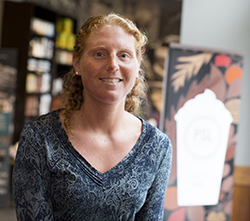
Coffee is ubiquitous in American culture, but its effects on health are not fully understood. By conducting research that combines traditional epidemiology and new biological approaches like genomics and metabolomics, Marilyn Cornelis, PhD, assistant professor in Preventive Medicine-Nutrition hopes to expand knowledge of health outcomes related to drinking coffee.
“What is interesting about coffee is that it’s been linked to potentially adverse and potentially protective effects,” she said. “People want to know if coffee is good or bad for them. The answer will depend on the individual. By accounting for genetic markers of response, we can try to make personalized recommendations for coffee consumption.”
Cornelis, who joined Feinberg’s faculty last November, became interested in coffee more than 10 years ago while investigating CYP1A2, a gene known to have a key role in caffeine metabolism. In a paper published in JAMA, she showed an association between coffee intake and increased risk of myocardial infarction for carriers of a variant of the gene that results in slow caffeine metabolism.
More recently, Cornelis led a large-scale study that linked six new genetic variants to coffee consumption. The research, published last October in Molecular Psychiatry, identified genes related to caffeine metabolism and caffeine’s psychoactive effects, as well as genes with no obvious connection to coffee drinking behavior.
Variations in metabolism and response to coffee can explain why some people can drink cup after cup while others skip it altogether. But the variations also make it difficult to draw broad conclusions about the benefits of increasing or decreasing intake.
“For example, coffee has been pretty consistently associated with a lower risk of type II diabetes and Parkinson’s disease,” Cornelis said. “But the amount of coffee to achieve these benefits may vary from one person to the next.”
In a new review published in Current Opinion in Lipidology, Cornelis outlined steps for research on coffee that consider these variations. She describes how systems epidemiology approaches can take advantage of genomic, transcriptomic, proteomic, and metabolomic technologies to help scientists discover the underlying mechanisms behind observed associations.
Importantly, she notes, while caffeine is likely the driver for most coffee consumption behavior, coffee has many components that could relate to health effects.
“By combining measures of habitual coffee intake behavior with measures of environmental and genetic factors modulating caffeine metabolism, we can now devise a more refined measure of biological internal dose of the caffeine component of coffee for use in epidemiological studies,” she wrote.
Cornelis’s work is support in part by the American Diabetes Association grant 7-13-JF-15.






